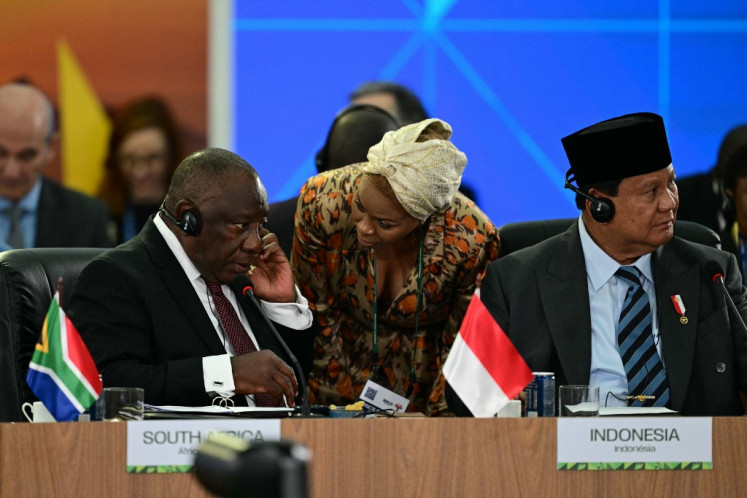Popular Reads
Top Results
Can't find what you're looking for?
View all search resultsPopular Reads
Top Results
Can't find what you're looking for?
View all search resultsHoliday allowances for online drivers are not mandatory
Director-General of Industrial Relations and Social Security for Manpower at the Ministry of Manpower Indah Anggoro Putri explained recently that online drivers are included in the scope of the ministry’s Circular Letter No.2/2024 regarding the implementation of the THR in 2024, because they fall under the category of PKWT, and are thus entitled to receive the THR. However, this was later confirmed to be merely an encouragement.
Change text size
Gift Premium Articles
to Anyone
P
roviding a holiday bonus (THR) to workers has become a widely discussed issue over the past few weeks, given that Idul Fitri is just a few weeks away. The THR itself is a mandatory non-wage income that employers must pay to workers or their families before religious holidays, with payment being made no later than seven days before the holiday. This provision is mandatory for workers who have permanent employment relationships (PKWTT) or contracts (PKWT).
However, the advancement of technology has led to the emergence of new relationship patterns outside of permanent employment or contractual relationships, namely partnership-based relationships commonly found among online drivers. In the gig economy concept, online drivers are paid not based on their working hours but based on the quantity of goods/services they provide. This raises the question of whether such partnership relationships can be categorized as contractual employment, thus entitling them to receive the THR.
Director-General of Industrial Relations and Social Security for Manpower at the Ministry of Manpower Indah Anggoro Putri explained recently that online drivers are included in the scope of the ministry’s Circular Letter No.2/2024 regarding the implementation of the THR in 2024, because they fall under the category of PKWT, and are thus entitled to receive the THR. However, this was later confirmed to be merely an encouragement. This means it may or may not be implemented; in other words, it is not binding but only voluntary.
In response to this, it should be clarified that partnership relationships and contractual employment are fundamentally different and should not be mixed, as this may lead to new problems in the future.
First, partnership relationships arise from partnership agreements, while employment relationships arise from employment agreements. Specifically, partnerships are governed by Articles 1618–1652 of the Civil Code regarding civil partnerships. A civil partnership is an agreement in which two or more persons bind themselves to contribute something to the partnership with the intention of sharing the profits arising from it.
Meanwhile, employment agreements are agreements between workers or employees and employers that contain the terms of employment, rights and obligations of the parties. These include elements of employment, wages and instructions. These elements determine whether online drivers are partners or employees. This was also addressed in Supreme Court Decision No. 841/2009 in cases involving taxi drivers and taxi companies, which stated that online driver relationships are partnerships, not employment, because they do not fulfill the wage and instruction criteria.
In this case, the wage element is not met because online drivers do not receive a fixed monthly wage, but rather their income is based on commissions/percentages of work completed. Furthermore, the instruction element is not met because the company does not have the authority to give orders to drivers in carrying out their work. An instruction is defined as "someone in authority commanding you to do something when they order you to do it." It explains that the element that must be present in a "command" is "in authority" or in power or authority. In this case, the company is not in a position of authority because online drivers have the freedom to accept or reject work orders.



















